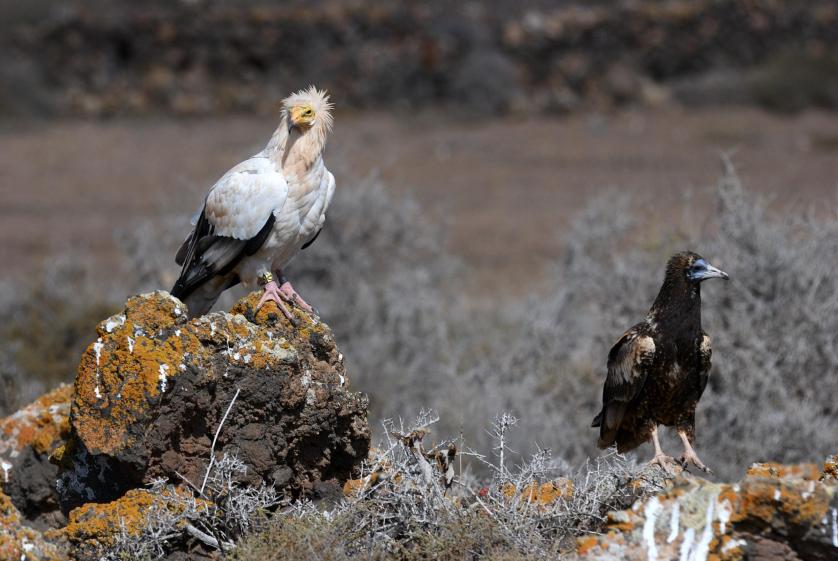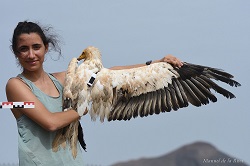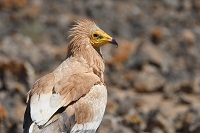Canarian Egyptian vulture was on the verge of extinction at the end of the 20th century. At that time, studies revealed that lead poisoning was a serious problem for the population's survival
The work has been possible thanks to the monitoring carried out since 1998 by the Doñana Biological Station in collaboration with the Canarian authorities.
The ban on hunting wild rabbits with shotguns and lead pellets on the island of Fuerteventura has led to reduced levels of this dangerous metal in the blood of the Canary Egyptian vulture (Neophron percnopterus majorensis), an endangered subspecies of Egyptian vulture endemic to the archipelago. The study, published in the prestigious journal Environmental Research, has been carried out by a scientific team from the Complutense University of Madrid, the University of Granada, the Doñana Biological Station, and the Institute for Research in Hunting Resources, both centers of the Spanish National Research Council (CSIC), and with the participation of the Government of the Canary Islands.
The monitoring carried out since 1998 by the Doñana Biological Station in collaboration with the Canary Islands authorities, was fundamental to carry out this study, with the periodic collection of blood samples from specimens caught for marking and banding. The analysis of 344 samples taken between 1999 and 2022 showed that blood lead levels, indicative of recent exposure to the metal, decreased from 2010 when wild rabbit hunting with shotguns was banned to be authorized only with dogs. Other factors that, a priori, could have been involved in this decrease, such as the decline in the number of hunting licenses, which was significant during the study period, did not have the same statistical relevance.
A factor that may be helping in their population recovery
The Canary Egyptian vulture was on the verge of extinction at the end of the 20th century, when a hundred individuals were counted occupying 20 territories. At that time, it was detected that lead poisoning was a serious problem for the relict population. Moreover, the accumulation of lead in bones, replacing calcium, reduced the mineralization degree and made them more fragile. "Lead can cause, at high doses, the death of the individual but also serious reproductive problems, affecting fertility or chick survival, since it can be transferred by the females to the eggs", says Rafael Mateo, a researcher at the IREC-CSIC and the person in charge of lab analyses.
Today, 25 years later, the population has increased fivefold thanks to the effectiveness of conservation measures taken by the Canary authorities, and mainly aimed at reducing non-natural mortality. "The case of the Canary Egyptian vulture is a paradigmatic example of how we can improve the conservation of a species when science and management work together and there is social support, as is the case of Fuerteventura and the Canary Islands in general", says José Antonio Donázar, scientific head of the Canary Egyptian vulture monitoring in the Doñana Biological Station.
The decline in lead levels observed in this study may also have contributed to the recovery of the population. However, high lead concentrations are still detected in blood, especially in adult individuals. This is due to the chronic accumulation of lead, that may be mobilized when calcium is required, such as during egg lying. Another cause is the fact that younger individuals prefer to feed on carcasses from slaughterhouses, at supplementary feeding points.
The solution is to expand hunting policy restrictions
Despite the ban on wild rabbit hunting with lead pellets, other game and non-game species are still be hunted with shotguns, such as pigeons, quails, or even squirrels. These species are also part of the diet of the Canary Egyptian vulture. Due to the absence of lead sources from industries or another source of contamination, these are the primary sources through which Egyptian vultures incorporate this metal into the blood in the Canary Islands.
According to Laura Gangoso, from the Complutense University of Madrid and lead author, "The solution of this problem inevitably requires the total ban of the use of lead for hunting. It has been known for a long time that lead is an extremely toxic metal that causes major problems for the environment and human health. Every year, up to 5000 tons of lead are dumped in the European Union for hunting. There is no technical reason why this metal can not be replaced by other materials. In fact, such measures are already in practice in European wetlands, in many protected areas in the continent, and even in entire countries such as Denmark".
Reference
Gangoso, L., Mateo, R., Santamaría-Cervantes, C., García-Alfonso, M., Gimeno-Castellano, C., Arrondo, E., Serrano, D., van Overveld, T., de la Riva, M., Cabrera, M., Donázar, J.A. 2024. Blood lead levels in an endangered vulture decline following changes in hunting activity. Environmental Research. https://doi.org/10.1016/j.envres.2024.118712
Contact
outreach @ ebd.csic.es



 Blood lead levels in an endangered vulture species decreased following restrictions on hunting practices
Blood lead levels in an endangered vulture species decreased following restrictions on hunting practices

